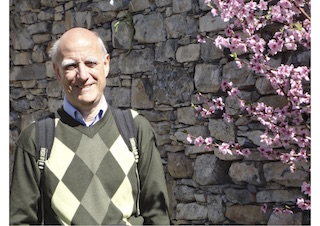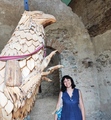Studying at the University of Verona
Here you can find information on the organisational aspects of the Programme, lecture timetables, learning activities and useful contact details for your time at the University, from enrolment to graduation.
Academic calendar
The academic calendar shows the deadlines and scheduled events that are relevant to students, teaching and technical-administrative staff of the University. Public holidays and University closures are also indicated. The academic year normally begins on 1 October each year and ends on 30 September of the following year.
Course calendar
The Academic Calendar sets out the degree programme lecture and exam timetables, as well as the relevant university closure dates..
| Period | From | To |
|---|---|---|
| Semestrino IA | Sep 28, 2015 | Nov 14, 2015 |
| Semestrino IB | Nov 16, 2015 | Jan 16, 2016 |
| Semestrino IIA | Feb 22, 2016 | Apr 16, 2016 |
| Semestrino IIB | Apr 18, 2016 | Jun 4, 2016 |
| Session | From | To |
|---|---|---|
| Sessione invernale | Jan 18, 2016 | Feb 20, 2016 |
| Sessione estiva | Jun 6, 2016 | Jul 30, 2016 |
| Sessione autunnale | Sep 1, 2016 | Sep 30, 2016 |
| Session | From | To |
|---|---|---|
| Sessione estiva | Jul 5, 2016 | Jul 6, 2016 |
| Sessione autunnale | Nov 22, 2016 | Nov 23, 2016 |
| Sessione invernale | Apr 3, 2017 | Apr 8, 2017 |
| Period | From | To |
|---|---|---|
| Festa di Ognissanti | Nov 1, 2015 | Nov 1, 2015 |
| Festa dell'Immacolata | Dec 8, 2015 | Dec 8, 2015 |
| Vacanze di Natale | Dec 23, 2015 | Jan 6, 2016 |
| Vancanze di Pasqua | Mar 24, 2016 | Mar 29, 2016 |
| Festa della Liberazione | Apr 25, 2016 | Apr 25, 2016 |
| Festa dei Lavoratori | May 1, 2016 | May 1, 2016 |
| Festa del S. Patrono S. Zeno | May 21, 2016 | May 21, 2016 |
| Festa della Repubblica | Jun 2, 2016 | Jun 2, 2016 |
| Vacanze estive | Aug 8, 2016 | Aug 15, 2016 |
Exam calendar
Exam dates and rounds are managed by the relevant Culture and Civilisation Teaching and Student Services Unit.
To view all the exam sessions available, please use the Exam dashboard on ESSE3.
If you forgot your login details or have problems logging in, please contact the relevant IT HelpDesk, or check the login details recovery web page.
Should you have any doubts or questions, please check the Enrollment FAQs
Academic staff
 angela.alaimo@univr.it
angela.alaimo@univr.it

Avezzu' Guido
 guido.avezzu@univr.it
guido.avezzu@univr.it
 augusto.barbi@univr.it
augusto.barbi@univr.it

Bassetti Massimiliano
 massimiliano.bassetti@univr.it
massimiliano.bassetti@univr.it
 045802 8376
045802 8376
 evita.calabrese@univr.it
evita.calabrese@univr.it
Carnero Roberto
 roberto.carnero@univr.it
roberto.carnero@univr.it
 alberto.cavarzere@univr.it
alberto.cavarzere@univr.it

Chiecchi Giuseppe
 giuseppe.chiecchi@univr.it
giuseppe.chiecchi@univr.it
 +39 045802 8117
+39 045802 8117
 federica.gonzato@univr.it
federica.gonzato@univr.it
 elisa.lerco@univr.it
elisa.lerco@univr.it
 francesco.lupi@univr.it
francesco.lupi@univr.it

Mastrocinque Attilio
 attilio.mastrocinque@univr.it
attilio.mastrocinque@univr.it
 +39 045802 8386
+39 045802 8386
 flavia.palma@univr.it
flavia.palma@univr.it

Pasini Roberto
 pasini.roberto@univr.it
pasini.roberto@univr.it
 +39 045802 8121
+39 045802 8121
Peresani Marco
 dino.piovan@univr.it
dino.piovan@univr.it

Pozzo Riccardo
 riccardo.pozzo@univr.it
riccardo.pozzo@univr.it
 +390458028053
+390458028053
 alberto.scandola@univr.it
alberto.scandola@univr.it
Tani Stefano
 stefano.tani@univr.it
stefano.tani@univr.it
 +39 045802 8110
+39 045802 8110
 sonia.trovato@univr.it
sonia.trovato@univr.it
 gianmaria.varanini@univr.it
gianmaria.varanini@univr.it
Study Plan
The Study Plan includes all modules, teaching and learning activities that each student will need to undertake during their time at the University.
Please select your Study Plan based on your enrollment year.
1° Year
| Modules | Credits | TAF | SSD |
|---|
One course to be chosen among the followingForeign language B1 (CB Test)2° Year activated in the A.Y. 2016/2017
| Modules | Credits | TAF | SSD |
|---|
Latin literature (i)
One course to be chosen among the following2 course to be chosen among the following2 course to be chosen among the following3° Year activated in the A.Y. 2017/2018
| Modules | Credits | TAF | SSD |
|---|
One course to be chosen among the following3 course to be chosen among the following| Modules | Credits | TAF | SSD |
|---|
One course to be chosen among the followingForeign language B1 (CB Test)| Modules | Credits | TAF | SSD |
|---|
Latin literature (i)
One course to be chosen among the following2 course to be chosen among the following2 course to be chosen among the following| Modules | Credits | TAF | SSD |
|---|
One course to be chosen among the following3 course to be chosen among the following| Modules | Credits | TAF | SSD |
|---|
Legend | Type of training activity (TTA)
TAF (Type of Educational Activity) All courses and activities are classified into different types of educational activities, indicated by a letter.
History of the Latin language (p) (2017/2018)
Teaching code
4S02198
Teacher
Coordinator
Credits
6
Language
Italian
Scientific Disciplinary Sector (SSD)
L-FIL-LET/04 - LATIN LANGUAGE AND LITERATURE
Period
First half of Semester 2 , Second half of Semester 2
Learning outcomes
The course propose an approach to History of the Latin Language and Female Speech and Poetry in Latin Language trough the reading of the Latin Texts. Prerequisites: Basic knowledge of the Latin Language.
Expected learning outcomes: at the end of the course students will be able to
- know the essential feautures of History of the Latin Language;
- translate and analyze the texts chosen for the course;
- develop autonomous ability to translate and analyze the text chosen for the course;
- improve the following communication skills: to reflect of different comunication codes (linguistic, poetic, ‘cultural gender’) in the Ancient Rome;
- develop autonomous ability to reflect on Variation in the Language and on gender as cultural practice.
Program
Female Speech and Poetry in Latin Language
1. Reading of latin texts for caracterization of Female Speech.
2. Female Poetry
3. Exemples of Fictional Femal Poetry
4. Essential feautures of History of the Latin Language
Bibliography:
1. Latin Text's Dossier available in typing office "30 e oltre".
M. Bettini – L. Ricottilli, Elogio dell’indiscrezione, “Studi Urbinati/B3”, 60 (1987), pp. 11-27;
E. Cantarella, Passato prossimo. Donne romane da Tacita a Sulpicia, Milano 1996.
2. Sulpiciae elegidia [Tibulli lib. III. XIII –XVIII = IV. VII-XII] in Tibulli aliorumque carminum libri tres, recognovit brevique adnotatione critica instruxit I. P. Postgate, Oxonii 1924 (e rist. succ.);
H. Tränkle, Appendix Tibulliana, Berlin und New York, De Gruyter, 1990;
Tibullo, Elegie, Milano, BUR, 1989, pp. 282 ss.
3. Ovidio, Lettere di eroine, a cura di G. Rosati, Milano, BUR, 1989, n. 4 e n.15.
P. Ovidi Nasoni Heroides, texte établi par H. Bornecque et traduit par M. Prévost, Paris 1965 (IV ed.), n. IV e XV.
M. Bettini – G. Guastella, Personata vox, in R. Raffaelli (cur.), Vicende e figure femminili in Grecia e a Roma, Ancona 1995, pp. 343-369;
4. F. Stolz – A. Debrunner – W.P. Schmid, Storia della lingua latina, Pàtron, Bologna 19934, capitoli II- VII, pp. 59 - 125;
in alternativa: J. Clackson and J. Horrocks, The Blackwell History of the Latin Language, Malden (Ma)/ Oxford 2007, capitoli V-VII, pp. 130-264.
Teaching methods:
Lectures, exercises and, where possible, seminar activities.
Examination Methods
The exam consist of an oral interview, partly via readings of texts in the original language, which intend to ascertain the level of achievement of the learning obiectives previously indicated.
N.B. Non-attending students are requested to contact the teacher in due advance so as to define a specific program.
Type D and Type F activities
Modules not yet included
Career prospects
Module/Programme news
News for students
There you will find information, resources and services useful during your time at the University (Student’s exam record, your study plan on ESSE3, Distance Learning courses, university email account, office forms, administrative procedures, etc.). You can log into MyUnivr with your GIA login details: only in this way will you be able to receive notification of all the notices from your teachers and your secretariat via email and soon also via the Univr app.
Graduation
List of theses and work experience proposals
| theses proposals | Research area |
|---|---|
| tesi di Glottologia, Storia comparata, Linguistica storica | ENGLISH LANGUAGE - Grammar and Syntax – Grammatik und Syntax |
| tesi di Glottologia, Storia comparata, Linguistica storica | GERMANIC LANGUAGE - Dialectology - Dialektologie |
| tesi di Glottologia, Storia comparata, Linguistica storica | HUMANITIES & SOCIAL STUDIES - HUMANITIES & SOCIAL STUDIES |
| tesi di Glottologia, Storia comparata, Linguistica storica | Indo-European languages & literatures - Indo-European languages & literatures |
| tesi di Glottologia, Storia comparata, Linguistica storica | LINGUISTICS - LINGUISTICS |
| Stage | Research area |
|---|---|
| Lavorare in archivio | Various topics |
| L'iter del libro in biblioteca | Various topics |
Gestione carriere
Linguistic training CLA
Student mentoring
Requisiti classi di abilitazione insegnamento
Requisiti necessari per accedere alle classi di abilitazione per l'insegnamento.
vedi allegato pdf
Inoltre, per informazioni sui 24 CFU nelle discipline antropo-psico-pedagogiche e nelle metodologie e tecnologie didattiche, si veda -> LINK
Documents
| Title | Info File |
|---|---|
|
|
pdf, it, 307 KB, 30/11/21 |













































